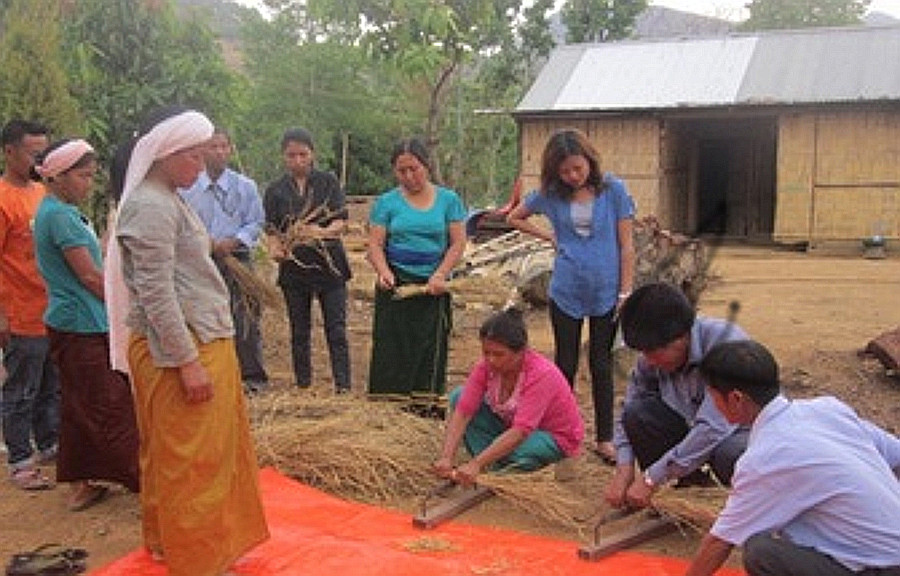Promoting Political, Social and Cultural Rights of Women to Uplift Sustainability
By: Katie Douglas, WEA Intern

Aring Standing and her team members sharing the traditional shawl woven by the women Self-Help Groups. Photo: WSDC
When Aring Rengsoring joined the WSDC training program in her village of Aimol Chingnunghut, she was already skilled in farming, weaving, and domestic work. Participating in the WSDC program allowed her to not only pass on these talents to others, but to strengthen her leadership abilities. It was leadership training that gave her the opportunity to challenge her community’s strict and discriminatory patriarchal structure. Aring was already a woman of many skills, but training from the partnership of WSDC and WEA gave her the resources to assert herself as an activist advocating for the rights of women in her community.
Gender justice, food sovereignty, and the right to just livelihoods are the issues that WSDC aims to conquer by leading educational trainings that teach women about their basic community rights to lead in their communities and government. When women are trained in peace and conflict resolution and sustainable livelihoods, they are better equipped to handle the amounts of violence, and food scarcity that have increased in the Chandel district due to climate change.
Although women have long been disregarded as “second-class citizens” in certain regions, this has not stopped the women of Manipur from rising forward to assert their rights throughout history. In 1939 women led a series of social movements known as the Nupi lan, or the “women’s war”, to protest British free trade laws that facilitated food shortages in their communities. However, today new issues have presented themselves in the form of dam construction, foreign farming practices, and the onslaught of climate change. Women’s rights are stressed by these newly introduced practices, which have forced the abandonment of traditional resource management and farming practices. In many communities women like Aring have no control over their earnings or land ownership, and many lack economic security because there is so little access to quality education or other skills training. As the women’s ability to provide for their family becomes increasingly limited, communities see consequential rises in sexual and economic exploitation, and violence that targets rural women.
To promote political, social and cultural rights is crucial for sustainable development and fundamental to the success of WSDC vision. WSDC creates opportunities for women to voice their concerns, and form women’s groups for collective training in advocacy and lobbying around the laws that directly affect their rights, and livelihoods. Through WSDC hundreds of women farmers are supplied with the resources for sustainable farming practices such as organic seeds and fertilizers, and training in organic crop management.

WEA and WSDC’s partnership supported 36 Farmers & 10 SHGs to receive training on mushroom cultivation. Photo: WSDC
WSDC also assists over 300 impoverished families by informing them of their entitlements to government ration programs, and supports women’s groups on their efforts to change laws that sustain discriminatory practices of violence against women.
After Aring’s WSDC training, she formed the Peace Self-Help Group (Peace SHG). This group of 12 women advocates for the concerns of women at the village government level. The work of Aring and the other women activists of Peace SHG has touched her entire community from helping families to access once restricted ration cards to creating a traditional weaving center where all profits earned provide micro credits to women farmers. Today Aring is an inspirational activist in her community who has furthered her WSDC training by spreading her knowledge and advocacy work to benefit the lives of her entire village.
